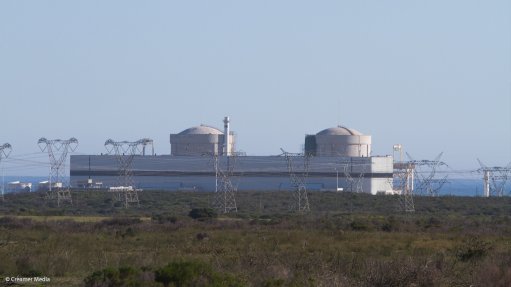
Koeberg nuclear power station
Photo by: Duane Daws
Apart from its recently announced temporary desalination plant, the Koeberg nuclear power station is working on a range of desalination projects, including a detailed feasibility study with the City of Cape Town on a large-scale desalination plant.
If the feasibility study is successful, it will be followed up with a large-scale seawater desalination plant.
“This has the potential to not only augment the water needed for the Koeberg power station, but for the city’s water supplies as well,” says Koeberg power station manager Velaphi Ntuli.
The large-scale project is owned by the City of Cape Town in collaboration with Koeberg and is divided into three phases.
Ntuli says a data collection plant (DCP) is expected to get under way at the end of March, subject to statutory approvals, while a pilot production plant could kick off nine months after the confirmation of data from the DCP.
A temporary groundwater desalination plant was launched at Koeberg last week, with water supplied from the borehole system on its grounds. Eskom has appointed a contractor to build, own, operate and maintain the plant, which has a production capacity of 920 kilolitres a day of high-quality potable water which can be used for process purposes, as well as human consumption.
The desalination process entails removing salts and other contaminants from groundwater to make it suitable for human consumption.
A permanent groundwater desalination plant at Koeberg is currently in the commercial phase.
Ntuli and Eskom executives say they have learnt valuable lessons through their desalination projects and plans so far.
They said timelines and plans for production were essential and that time was needed to get samples for permits. Stakeholders also needed to be engaged in the process and kept abreast of developments. They said the screening process to source the right suppliers could be complex and needed time and attention.
Eskom launched its Water Resilience Strategy in March 2017 with aims of mitigating business risk, to positively contribute to the efforts of the City of Cape Town and lessen the contribution to Day Zero of staff and contractors.
The nuclear power station has notched up water savings of 35% since June 2017, but Ntuli says it has the potential to save an additional 130 kilolitres of water a day.
Koeberg can currently operate for about two weeks without off-site potable water.
Water shortages in the Western Cape have prompted plans for desalination projects.
“Eskom Koeberg has initiated a sustainable strategy to address the current water supply challenge in the Western Cape, enabling it to continuously provide safe electricity by having an overriding focus on nuclear safety,” said Ntuli.
The Koeberg nuclear power station has been owned and operated by Eskom since 1984.